Deck 10: B: Basic Macroeconomic Relationships
Question
Question
Question
Question
Question
Question
Question
Question
Question
Question
Question
Question
Question
Question
Question
Question
Question
Question
Question
Question
Question
Question
Question
Question
Question
Question
Question
Question
Question
Question
Question
Question
Question
Question
Question
Question
Question
Question
Question
Question
Question
Question
Question
Question
Question
Question
Question
Question
Question
Question
Question
Question
Question
Question
Question
Question
Question
Question
Question
Question
Question
Question
Question
Question
Question
Question
Question
Question
Question
Question
Question
Question
Question
Question
Question
Question
Question
Question
Question
Question

Unlock Deck
Sign up to unlock the cards in this deck!
Unlock Deck
Unlock Deck
1/200
Play
Full screen (f)
Deck 10: B: Basic Macroeconomic Relationships
1
A business firm will purchase additional capital goods if the real rate of interest it must pay is less than the expected rate of return from the investment.
True
2
A specific investment will be undertaken if the expected rate of returns, r, exceeds the interest rate, i.
True
3
The multiplier is equal to the reciprocal of the MPC.
False
4
1 + MPS = MPC.

Unlock Deck
Unlock for access to all 200 flashcards in this deck.
Unlock Deck
k this deck
5
The most important determinant of consumer spending is:
A)the level of household debt.
B)consumer expectations.
C)the stock of wealth.
D)the level of disposable income.
A)the level of household debt.
B)consumer expectations.
C)the stock of wealth.
D)the level of disposable income.

Unlock Deck
Unlock for access to all 200 flashcards in this deck.
Unlock Deck
k this deck
6
The slope of the saving schedule measures the size of the multiplier.

Unlock Deck
Unlock for access to all 200 flashcards in this deck.
Unlock Deck
k this deck
7
If the MPC is constant at various levels of income, then the APC must also be constant at all of these income levels.

Unlock Deck
Unlock for access to all 200 flashcards in this deck.
Unlock Deck
k this deck
8
The most important determinant of consumption and saving is the:
A)level of bank credit.
B)level of disposable income.
C)interest rate.
D)price level.
A)level of bank credit.
B)level of disposable income.
C)interest rate.
D)price level.

Unlock Deck
Unlock for access to all 200 flashcards in this deck.
Unlock Deck
k this deck
9
The average propensity to consume can be defined as income divided by consumption.

Unlock Deck
Unlock for access to all 200 flashcards in this deck.
Unlock Deck
k this deck
10
The slope of the consumption schedule is equal to the marginal propensity to consume.

Unlock Deck
Unlock for access to all 200 flashcards in this deck.
Unlock Deck
k this deck
11
The wealth effect will tend to decrease consumption and increase saving.

Unlock Deck
Unlock for access to all 200 flashcards in this deck.
Unlock Deck
k this deck
12
If the Brown family's marginal propensity to consume is 0.70, then it will consume seven-tenths of its total income.

Unlock Deck
Unlock for access to all 200 flashcards in this deck.
Unlock Deck
k this deck
13
The reverse wealth effect will tend to decrease consumption and increase saving.

Unlock Deck
Unlock for access to all 200 flashcards in this deck.
Unlock Deck
k this deck
14
The slope of the consumption schedule is measured by the MPC.

Unlock Deck
Unlock for access to all 200 flashcards in this deck.
Unlock Deck
k this deck
15
The initial costs of capital goods, and the estimated costs of operating and maintaining those goods, affect the expected rate of return on investment.

Unlock Deck
Unlock for access to all 200 flashcards in this deck.
Unlock Deck
k this deck
16
The business investment is not based on the expected returns.

Unlock Deck
Unlock for access to all 200 flashcards in this deck.
Unlock Deck
k this deck
17
Economists disagree on the actual size of the multiplier.

Unlock Deck
Unlock for access to all 200 flashcards in this deck.
Unlock Deck
k this deck
18
1 - MPC = MPS.

Unlock Deck
Unlock for access to all 200 flashcards in this deck.
Unlock Deck
k this deck
19
The greater the MPC, the greater the multiplier.

Unlock Deck
Unlock for access to all 200 flashcards in this deck.
Unlock Deck
k this deck
20
If the MPS is 1, the multiplier will be 1.

Unlock Deck
Unlock for access to all 200 flashcards in this deck.
Unlock Deck
k this deck
21
The saving schedule is drawn on the assumption that as income increases:
A)saving will decline absolutely and as a percentage of income.
B)saving will increase absolutely, but remain constant as a percentage of income.
C)saving will increase absolutely, but decline as a percentage of income.
D)saving will increase absolutely and as a percentage of income.
A)saving will decline absolutely and as a percentage of income.
B)saving will increase absolutely, but remain constant as a percentage of income.
C)saving will increase absolutely, but decline as a percentage of income.
D)saving will increase absolutely and as a percentage of income.

Unlock Deck
Unlock for access to all 200 flashcards in this deck.
Unlock Deck
k this deck
22
The consumption schedule relates:
A)consumption to the level of disposable income.
B)saving to the level of disposable income.
C)disposable income to domestic income.
D)consumption to saving.
A)consumption to the level of disposable income.
B)saving to the level of disposable income.
C)disposable income to domestic income.
D)consumption to saving.

Unlock Deck
Unlock for access to all 200 flashcards in this deck.
Unlock Deck
k this deck
23
The consumption schedule is drawn on the assumption that as disposable income increases consumption will:
A)be unaffected.
B)increase absolutely, but remain constant as a percentage of income.
C)increase absolutely, but decline as a percentage of income.
D)increase absolutely and as a percentage of income.
A)be unaffected.
B)increase absolutely, but remain constant as a percentage of income.
C)increase absolutely, but decline as a percentage of income.
D)increase absolutely and as a percentage of income.

Unlock Deck
Unlock for access to all 200 flashcards in this deck.
Unlock Deck
k this deck
24
Which of the following equations correctly represents the data below? 
A)Yd = 40 + .6C
B)C = 60 + .4Yd
C)C = 40 + .6Yd
D)C = .6Yd

A)Yd = 40 + .6C
B)C = 60 + .4Yd
C)C = 40 + .6Yd
D)C = .6Yd

Unlock Deck
Unlock for access to all 200 flashcards in this deck.
Unlock Deck
k this deck
25
If the equation C = 20 + .6Y, where C is consumption and Y is disposable income, were graphed:
A)the vertical intercept would be +.6 and the slope would be +20.
B)it would reveal an inverse relationship between consumption and disposable income.
C)the vertical intercept would be negative, but consumption would increase as disposable income rises.
D)the vertical intercept would be +20 and the slope would be +.6.
A)the vertical intercept would be +.6 and the slope would be +20.
B)it would reveal an inverse relationship between consumption and disposable income.
C)the vertical intercept would be negative, but consumption would increase as disposable income rises.
D)the vertical intercept would be +20 and the slope would be +.6.

Unlock Deck
Unlock for access to all 200 flashcards in this deck.
Unlock Deck
k this deck
26
A decline in disposable income:
A)increases consumption by moving upward along a specific consumption schedule.
B)decreases consumption because it shifts the consumption schedule downward.
C)decreases consumption by moving downward along a specific consumption schedule.
D)increases consumption because it shifts the consumption schedule upward.
A)increases consumption by moving upward along a specific consumption schedule.
B)decreases consumption because it shifts the consumption schedule downward.
C)decreases consumption by moving downward along a specific consumption schedule.
D)increases consumption because it shifts the consumption schedule upward.

Unlock Deck
Unlock for access to all 200 flashcards in this deck.
Unlock Deck
k this deck
27
If the consumption schedule is linear, then the:
A)saving schedule will also be linear.
B)MPS will decline as income rises.
C)MPC will decline as income rises.
D)APC will be constant at all levels of income.
A)saving schedule will also be linear.
B)MPS will decline as income rises.
C)MPC will decline as income rises.
D)APC will be constant at all levels of income.

Unlock Deck
Unlock for access to all 200 flashcards in this deck.
Unlock Deck
k this deck
28
The 45-degree line on a chart relating consumption and income shows:
A)all points where the MPC is constant.
B)all points at which saving and income are equal.
C)all the points at which consumption and income are equal.
D)the amounts households will plan to save at each possible level of income.
A)all points where the MPC is constant.
B)all points at which saving and income are equal.
C)all the points at which consumption and income are equal.
D)the amounts households will plan to save at each possible level of income.

Unlock Deck
Unlock for access to all 200 flashcards in this deck.
Unlock Deck
k this deck
29
The consumption schedule in the diagram below indicates that: 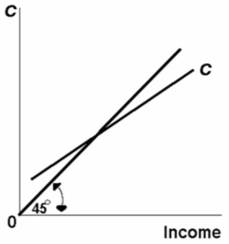
A)consumers will maximize their satisfaction where the consumption schedule and 45 line intersect.
B)up to a point consumption exceeds income, but then falls below income.
C)the MPC falls as income increases.
D)households consume as much as they earn.

A)consumers will maximize their satisfaction where the consumption schedule and 45 line intersect.
B)up to a point consumption exceeds income, but then falls below income.
C)the MPC falls as income increases.
D)households consume as much as they earn.

Unlock Deck
Unlock for access to all 200 flashcards in this deck.
Unlock Deck
k this deck
30
Refer to the data below.When plotted on a graph, the vertical intercept of the consumption schedule in this economy is _____ and the slope is _____. 
A)-2; 1
B)$2; .18
C)$100; .5
D)$2; .9

A)-2; 1
B)$2; .18
C)$100; .5
D)$2; .9

Unlock Deck
Unlock for access to all 200 flashcards in this deck.
Unlock Deck
k this deck
31
If the MPC is .8 and the disposable income is $200, then
A)consumption and saving cannot be determined from the information given.
B)saving will be $20.
C)personal consumption expenditures will be $80.
D)saving will be $40.
A)consumption and saving cannot be determined from the information given.
B)saving will be $20.
C)personal consumption expenditures will be $80.
D)saving will be $40.

Unlock Deck
Unlock for access to all 200 flashcards in this deck.
Unlock Deck
k this deck
32
The equation C = 35 + .75Y, where C is consumption and Y is disposable income, tells us that:
A)households will consume three-fourths of whatever level of disposable income they receive.
B)households will consume $35 if their disposable income is zero and will consume three-fourths of any increase in disposable income they receive.
C)there is an inverse relationship between disposable income and consumption.
D)households will save $35 if their disposable income is zero and will consume three-fourths of any increase in disposable income they receive.
A)households will consume three-fourths of whatever level of disposable income they receive.
B)households will consume $35 if their disposable income is zero and will consume three-fourths of any increase in disposable income they receive.
C)there is an inverse relationship between disposable income and consumption.
D)households will save $35 if their disposable income is zero and will consume three-fourths of any increase in disposable income they receive.

Unlock Deck
Unlock for access to all 200 flashcards in this deck.
Unlock Deck
k this deck
33
The saving schedule is such that as aggregate income increases by a certain amount, saving:
A)increases by the same amount as the increase in income.
B)does not change.
C)increases.
D)decreases.
A)increases by the same amount as the increase in income.
B)does not change.
C)increases.
D)decreases.

Unlock Deck
Unlock for access to all 200 flashcards in this deck.
Unlock Deck
k this deck
34
The consumption schedule shows:
A)that the MPC increases in proportion to GDP.
B)that households consume more when interest rates are low.
C)that consumption depends primarily upon the level of business investment.
D)the amounts households plan or intend to consume at various possible levels of aggregate income.
A)that the MPC increases in proportion to GDP.
B)that households consume more when interest rates are low.
C)that consumption depends primarily upon the level of business investment.
D)the amounts households plan or intend to consume at various possible levels of aggregate income.

Unlock Deck
Unlock for access to all 200 flashcards in this deck.
Unlock Deck
k this deck
35
The consumption schedule shows:
A)a direct relationship between aggregate consumption and accumulated wealth.
B)a direct relationship between aggregate consumption and aggregate income.
C)an inverse relationship between aggregate consumption and accumulated financial wealth.
D)an inverse relationship between aggregate consumption and aggregate income.
A)a direct relationship between aggregate consumption and accumulated wealth.
B)a direct relationship between aggregate consumption and aggregate income.
C)an inverse relationship between aggregate consumption and accumulated financial wealth.
D)an inverse relationship between aggregate consumption and aggregate income.

Unlock Deck
Unlock for access to all 200 flashcards in this deck.
Unlock Deck
k this deck
36
The relationship between consumption and disposable income is such that:
A)an inverse and stable relationship exists between consumption and income.
B)a direct, but very volatile, relationship exists between consumption and income.
C)a direct and quite stable relationship exists between consumption and income.
D)the two are always equal.
A)an inverse and stable relationship exists between consumption and income.
B)a direct, but very volatile, relationship exists between consumption and income.
C)a direct and quite stable relationship exists between consumption and income.
D)the two are always equal.

Unlock Deck
Unlock for access to all 200 flashcards in this deck.
Unlock Deck
k this deck
37
Dissaving occurs where:
A)income exceeds consumption.
B)saving exceeds consumption.
C)consumption exceeds income.
D)saving exceeds income.
A)income exceeds consumption.
B)saving exceeds consumption.
C)consumption exceeds income.
D)saving exceeds income.

Unlock Deck
Unlock for access to all 200 flashcards in this deck.
Unlock Deck
k this deck
38
Given the consumption schedule, it is possible to graph the relevant saving schedule by:
A)subtracting the MPC from "one" at each level of income.
B)subtracting investment from consumption at each level of GDP.
C)plotting the horizontal differences between the consumption schedule and the 45-degree line.
D)plotting the vertical differences between the consumption schedule and the 45-degree line.
A)subtracting the MPC from "one" at each level of income.
B)subtracting investment from consumption at each level of GDP.
C)plotting the horizontal differences between the consumption schedule and the 45-degree line.
D)plotting the vertical differences between the consumption schedule and the 45-degree line.

Unlock Deck
Unlock for access to all 200 flashcards in this deck.
Unlock Deck
k this deck
39
As disposable income increases, consumption:
A)and saving both increase.
B)and saving both decrease.
C)decreases and saving increases.
D)increases and saving decreases.
A)and saving both increase.
B)and saving both decrease.
C)decreases and saving increases.
D)increases and saving decreases.

Unlock Deck
Unlock for access to all 200 flashcards in this deck.
Unlock Deck
k this deck
40
Dissaving means:
A)the same thing as disinvesting.
B)that households are spending in excess of their current incomes.
C)that saving and investment are equal.
D)that disposable income is less than zero.
A)the same thing as disinvesting.
B)that households are spending in excess of their current incomes.
C)that saving and investment are equal.
D)that disposable income is less than zero.

Unlock Deck
Unlock for access to all 200 flashcards in this deck.
Unlock Deck
k this deck
41
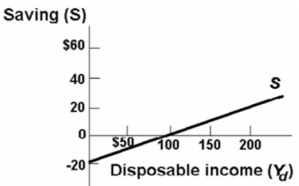 Refer to the above diagram.The break-even level of disposable income:
Refer to the above diagram.The break-even level of disposable income:A)is zero.
B)is minus $10.
C)is $100.
D)cannot be determined from the information given.

Unlock Deck
Unlock for access to all 200 flashcards in this deck.
Unlock Deck
k this deck
42
The average propensity to consume indicates the:
A)amount by which income exceeds consumption.
B)relationship between a change in saving and the consequent change in consumption.
C)percentage of total income which will be consumed.
D)percentage of a change in income which will be consumed.
A)amount by which income exceeds consumption.
B)relationship between a change in saving and the consequent change in consumption.
C)percentage of total income which will be consumed.
D)percentage of a change in income which will be consumed.

Unlock Deck
Unlock for access to all 200 flashcards in this deck.
Unlock Deck
k this deck
43
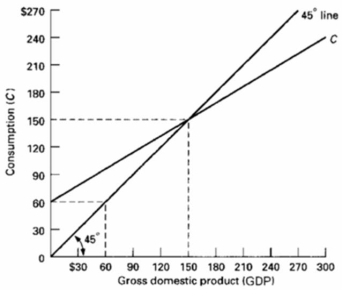 Refer to the above diagram.The break-even level of income is:
Refer to the above diagram.The break-even level of income is:A)zero.
B)150
C)60
D)120

Unlock Deck
Unlock for access to all 200 flashcards in this deck.
Unlock Deck
k this deck
44
If the equation for the consumption schedule is C = 20 + 0.8Y, where C is consumption and Y is disposable income, then the average propensity to consume is 1 when disposable income is:
A)$80
B)$100
C)$120
D)$160
A)$80
B)$100
C)$120
D)$160

Unlock Deck
Unlock for access to all 200 flashcards in this deck.
Unlock Deck
k this deck
45
The APC can be defined as the fraction of a:
A)change in income which is not spent.
B)change in income which is spent.
C)specific level of total income which is not consumed.
D)specific level of total income which is consumed.
A)change in income which is not spent.
B)change in income which is spent.
C)specific level of total income which is not consumed.
D)specific level of total income which is consumed.

Unlock Deck
Unlock for access to all 200 flashcards in this deck.
Unlock Deck
k this deck
46
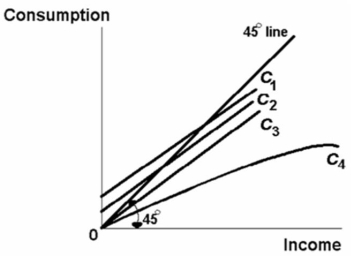 Refer to the above diagram.The MPC and APC are both constant as income increases for:
Refer to the above diagram.The MPC and APC are both constant as income increases for:A)none of the consumption schedules shown.
B)C3 only.
C)C3 and C4 only.
D)C1 and C2 only.

Unlock Deck
Unlock for access to all 200 flashcards in this deck.
Unlock Deck
k this deck
47
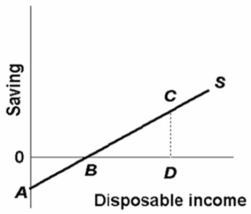 Refer to the above diagram.At disposable income level D, consumption:
Refer to the above diagram.At disposable income level D, consumption:A)is equal to CD.
B)is equal to OD minus CD.
C)is equal to CD/OD.
D)is equal to CD plus BD.

Unlock Deck
Unlock for access to all 200 flashcards in this deck.
Unlock Deck
k this deck
48
For all levels of income to the left of the intersection of the 45-degree line and the consumption schedule, the APC is:
A)greater than 100 percent.
B)less than the APS.
C)equal to the MPC.
D)equal to 100 percent.
A)greater than 100 percent.
B)less than the APS.
C)equal to the MPC.
D)equal to 100 percent.

Unlock Deck
Unlock for access to all 200 flashcards in this deck.
Unlock Deck
k this deck
49
Which of the following equations represents the saving schedule implicit in the data below? 
A)S = C - Yd
B)S = 40 + .4Yd
C)S = 40 + .6Yd
D)S = -40 + .4Yd

A)S = C - Yd
B)S = 40 + .4Yd
C)S = 40 + .6Yd
D)S = -40 + .4Yd

Unlock Deck
Unlock for access to all 200 flashcards in this deck.
Unlock Deck
k this deck
50
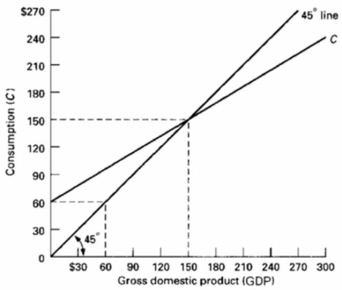 Refer to the above diagram.The equation for the saving schedule is:
Refer to the above diagram.The equation for the saving schedule is:A)S = .6Y.
B)Y = 60 + .6S.
C)S = 60 + .4Y.
D)S = -60 + .4Y.

Unlock Deck
Unlock for access to all 200 flashcards in this deck.
Unlock Deck
k this deck
51
As aggregate income increases, the APC:
A)and APS will both increase.
B)will decrease, but the APS will increase.
C)will increase, but the APS will decrease.
D)and APS will both decrease.
A)and APS will both increase.
B)will decrease, but the APS will increase.
C)will increase, but the APS will decrease.
D)and APS will both decrease.

Unlock Deck
Unlock for access to all 200 flashcards in this deck.
Unlock Deck
k this deck
52
One can determine the amount of consumption at any level of total income by:
A)multiplying total income by the slope of the consumption schedule.
B)multiplying total income by the APC.
C)subtracting the MPS from total income.
D)multiplying total income by the MPC.
A)multiplying total income by the slope of the consumption schedule.
B)multiplying total income by the APC.
C)subtracting the MPS from total income.
D)multiplying total income by the MPC.

Unlock Deck
Unlock for access to all 200 flashcards in this deck.
Unlock Deck
k this deck
53
As aggregate income decreases, the APC:
A)and APS will both increase.
B)will decrease, but the APS will increase.
C)will increase, but the APS will decrease.
D)and APS will both decrease.
A)and APS will both increase.
B)will decrease, but the APS will increase.
C)will increase, but the APS will decrease.
D)and APS will both decrease.

Unlock Deck
Unlock for access to all 200 flashcards in this deck.
Unlock Deck
k this deck
54
At the point where the consumption schedule intersects the 45-degree line:
A)the MPC is 1.00.
B)the APC is 1.00.
C)saving is equal to consumption.
D)the economy is in equilibrium.
A)the MPC is 1.00.
B)the APC is 1.00.
C)saving is equal to consumption.
D)the economy is in equilibrium.

Unlock Deck
Unlock for access to all 200 flashcards in this deck.
Unlock Deck
k this deck
55
At the point where the consumption schedule intersects the 45-degree line:
A)the MPC equals 1.
B)the APC is zero.
C)saving equals income.
D)saving is zero.
A)the MPC equals 1.
B)the APC is zero.
C)saving equals income.
D)saving is zero.

Unlock Deck
Unlock for access to all 200 flashcards in this deck.
Unlock Deck
k this deck
56
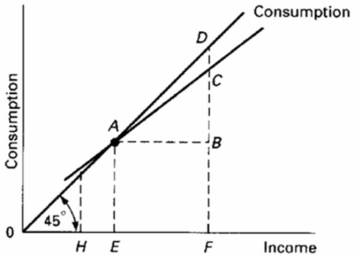 Refer to the above diagram.At income level F the volume of saving is:
Refer to the above diagram.At income level F the volume of saving is:A)BD.
B)AB.
C)CF - BF.
D)DC.

Unlock Deck
Unlock for access to all 200 flashcards in this deck.
Unlock Deck
k this deck
57
The APC can be defined as:
A)change in consumption/change in income
B)consumption/income
C)change in income/change in consumption
D)income/consumption
A)change in consumption/change in income
B)consumption/income
C)change in income/change in consumption
D)income/consumption

Unlock Deck
Unlock for access to all 200 flashcards in this deck.
Unlock Deck
k this deck
58
Suppose a family's consumption exceeds its disposable income.This means that its:
A)MPC is greater than 1.
B)MPS is negative.
C)APC is greater than 1.
D)APS is positive.
A)MPC is greater than 1.
B)MPS is negative.
C)APC is greater than 1.
D)APS is positive.

Unlock Deck
Unlock for access to all 200 flashcards in this deck.
Unlock Deck
k this deck
59
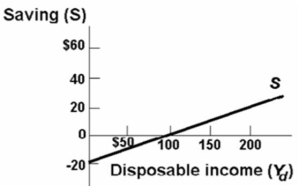 The equation for the above saving schedule is:
The equation for the above saving schedule is:A)Yd = -20 + .8S.
B)Yd = 20 + .2S.
C)S = 20 + .8Yd.
D)S = -20 + .2Yd.

Unlock Deck
Unlock for access to all 200 flashcards in this deck.
Unlock Deck
k this deck
60
As disposable income goes up the:
A)APC falls.
B)APS falls.
C)volume of consumption declines absolutely.
D)volume of investment can be expected to diminish.
A)APC falls.
B)APS falls.
C)volume of consumption declines absolutely.
D)volume of investment can be expected to diminish.

Unlock Deck
Unlock for access to all 200 flashcards in this deck.
Unlock Deck
k this deck
61
Following is consumption schedules for three private closed economies.DI signifies disposable income and C represents consumption expenditures.All figures are in billions of dollars.  Refer to the above data.At an income level of $40 billion, the average propensity to consume:
Refer to the above data.At an income level of $40 billion, the average propensity to consume:
A)is highest in economy (1).
B)is highest in economy (2).
C)is highest in economy (3).
D)cannot be determined from the data given.
 Refer to the above data.At an income level of $40 billion, the average propensity to consume:
Refer to the above data.At an income level of $40 billion, the average propensity to consume:A)is highest in economy (1).
B)is highest in economy (2).
C)is highest in economy (3).
D)cannot be determined from the data given.

Unlock Deck
Unlock for access to all 200 flashcards in this deck.
Unlock Deck
k this deck
62
 Refer to the above data.At the $100 level of income, the average propensity to save is:
Refer to the above data.At the $100 level of income, the average propensity to save is:A).10.
B).20.
C).25.
D).90.

Unlock Deck
Unlock for access to all 200 flashcards in this deck.
Unlock Deck
k this deck
63
 Refer to the above data.The marginal propensity to consume is:
Refer to the above data.The marginal propensity to consume is:A)0.25
B).75.
C).20.
D).80.

Unlock Deck
Unlock for access to all 200 flashcards in this deck.
Unlock Deck
k this deck
64
If Ben's MPC is .80, this means that he will:
A)spend eight-tenths of any increase in his disposable income.
B)spend eight-tenths of any level of disposable income.
C)break even when his disposable income is $8,000.
D)save eight-tenths of any level of disposable income.
A)spend eight-tenths of any increase in his disposable income.
B)spend eight-tenths of any level of disposable income.
C)break even when his disposable income is $8,000.
D)save eight-tenths of any level of disposable income.

Unlock Deck
Unlock for access to all 200 flashcards in this deck.
Unlock Deck
k this deck
65
Following is consumption schedules for three private closed economies.DI signifies disposable income and C represents consumption expenditures.All figures are in billions of dollars.  Refer to the above data.The marginal propensity to consume:
Refer to the above data.The marginal propensity to consume:
A)is highest in economy (1).
B)is highest in economy (3).
C)is highest in economy (2).
D)cannot be calculated from the data given.
 Refer to the above data.The marginal propensity to consume:
Refer to the above data.The marginal propensity to consume:A)is highest in economy (1).
B)is highest in economy (3).
C)is highest in economy (2).
D)cannot be calculated from the data given.

Unlock Deck
Unlock for access to all 200 flashcards in this deck.
Unlock Deck
k this deck
66
Following is consumption schedules for three private closed economies.DI signifies disposable income and C represents consumption expenditures.All figures are in billions of dollars.  Refer to the above data.The marginal propensity to consume in economy (1):
Refer to the above data.The marginal propensity to consume in economy (1):
A)is .5.
B)is .3.
C)is .8.
D)is .7.
 Refer to the above data.The marginal propensity to consume in economy (1):
Refer to the above data.The marginal propensity to consume in economy (1):A)is .5.
B)is .3.
C)is .8.
D)is .7.

Unlock Deck
Unlock for access to all 200 flashcards in this deck.
Unlock Deck
k this deck
67
With an MPS of .4, the MPC will be:
A)1.0 minus .4.
B).4 minus 1.0.
C)the reciprocal of the MPS.
D).4.
A)1.0 minus .4.
B).4 minus 1.0.
C)the reciprocal of the MPS.
D).4.

Unlock Deck
Unlock for access to all 200 flashcards in this deck.
Unlock Deck
k this deck
68
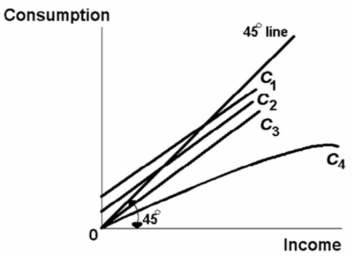 Refer to the above diagram.The APC diminishes as income increases for:
Refer to the above diagram.The APC diminishes as income increases for:A)none of the consumption schedules shown.
B)C3 only.
C)C1, and C2.
D)C4 only.

Unlock Deck
Unlock for access to all 200 flashcards in this deck.
Unlock Deck
k this deck
69
Following is consumption schedules for three private closed economies.DI signifies disposable income and C represents consumption expenditures.All figures are in billions of dollars.  Refer to the above data.The marginal propensity to save:
Refer to the above data.The marginal propensity to save:
A)is highest in economy (1).
B)is highest in economy (2).
C)is highest in economy (3).
D)cannot be determined from the data given.
 Refer to the above data.The marginal propensity to save:
Refer to the above data.The marginal propensity to save:A)is highest in economy (1).
B)is highest in economy (2).
C)is highest in economy (3).
D)cannot be determined from the data given.

Unlock Deck
Unlock for access to all 200 flashcards in this deck.
Unlock Deck
k this deck
70
 Refer to the above data.The slope of the saving schedule is:
Refer to the above data.The slope of the saving schedule is:A).80.
B).10.
C).20.
D).15.

Unlock Deck
Unlock for access to all 200 flashcards in this deck.
Unlock Deck
k this deck
71
 Refer to the above data.At the $200 level of disposable income:
Refer to the above data.At the $200 level of disposable income:A)the marginal propensity to save is 21/2 percent.
B)dissaving is $5.
C)the average propensity to save is .20.
D)the average propensity to consume is .80.

Unlock Deck
Unlock for access to all 200 flashcards in this deck.
Unlock Deck
k this deck
72
If Smith's disposable income increases from $1,200 to $1,700 and her level of saving increases from minus $100 to a plus $100, it may be concluded that her marginal propensity to:
A)save is three-fifths.
B)consume is one-half.
C)consume is three-fifths.
D)consume is one-sixth.
A)save is three-fifths.
B)consume is one-half.
C)consume is three-fifths.
D)consume is one-sixth.

Unlock Deck
Unlock for access to all 200 flashcards in this deck.
Unlock Deck
k this deck
73
Refer to the diagram given below. 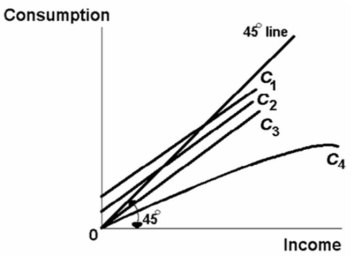 The diagram given above shows consumption schedules.As income rises, the marginal propensity to consume remains constant for:
The diagram given above shows consumption schedules.As income rises, the marginal propensity to consume remains constant for:
A)none of the consumption schedules.
B)only C3.
C)only C1, C2, and C3.
D)only C4.
 The diagram given above shows consumption schedules.As income rises, the marginal propensity to consume remains constant for:
The diagram given above shows consumption schedules.As income rises, the marginal propensity to consume remains constant for:A)none of the consumption schedules.
B)only C3.
C)only C1, C2, and C3.
D)only C4.

Unlock Deck
Unlock for access to all 200 flashcards in this deck.
Unlock Deck
k this deck
74
Holly's break-even level of income is $10,000 and her MPC is 0.75.If her actual disposable income is $16,000, her level of:
A)consumption spending will be $14,500.
B)consumption spending will be $4,500.
C)consumption spending will be $13,000.
D)saving will be $2,500.
A)consumption spending will be $14,500.
B)consumption spending will be $4,500.
C)consumption spending will be $13,000.
D)saving will be $2,500.

Unlock Deck
Unlock for access to all 200 flashcards in this deck.
Unlock Deck
k this deck
75
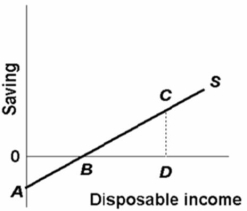 Refer to the above diagram.At disposable income level D, the average propensity to save is equal to:
Refer to the above diagram.At disposable income level D, the average propensity to save is equal to:A)CD/BD.
B)CD/0D.
C)0D/CD.
D)0A/0B.

Unlock Deck
Unlock for access to all 200 flashcards in this deck.
Unlock Deck
k this deck
76
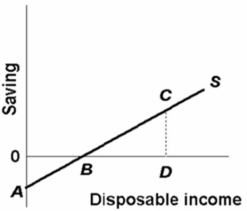 Refer to the above diagram.The marginal propensity to save is equal to:
Refer to the above diagram.The marginal propensity to save is equal to:A)CD/0D.
B)0B/0A.
C)0D/0D.
D)CD/BD.

Unlock Deck
Unlock for access to all 200 flashcards in this deck.
Unlock Deck
k this deck
77
The MPC can be defined as the fraction of a:
A)change in income which is not spent.
B)change in income which is spent.
C)given total income which is not consumed.
D)given total income which is consumed.
A)change in income which is not spent.
B)change in income which is spent.
C)given total income which is not consumed.
D)given total income which is consumed.

Unlock Deck
Unlock for access to all 200 flashcards in this deck.
Unlock Deck
k this deck
78
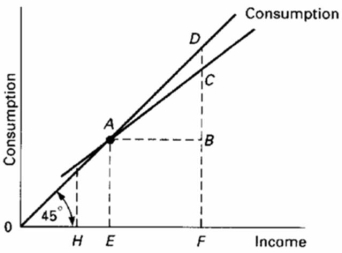 Refer to the above diagram.The marginal propensity to save is:
Refer to the above diagram.The marginal propensity to save is:A)CD/EF.
B)CB/CF.
C)CB/AF.
D)EF/CB.

Unlock Deck
Unlock for access to all 200 flashcards in this deck.
Unlock Deck
k this deck
79
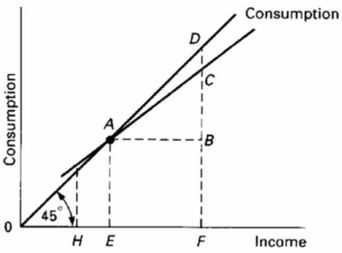 Refer to the above diagram.The marginal propensity to consume is equal to:
Refer to the above diagram.The marginal propensity to consume is equal to:A)AE/0E.
B)CB/AB.
C)CF/CD.
D)CD/CF.

Unlock Deck
Unlock for access to all 200 flashcards in this deck.
Unlock Deck
k this deck
80
 Refer to the above data.The marginal propensity to consume is:
Refer to the above data.The marginal propensity to consume is:A).80.
B).75.
C).20.
D).25.

Unlock Deck
Unlock for access to all 200 flashcards in this deck.
Unlock Deck
k this deck



